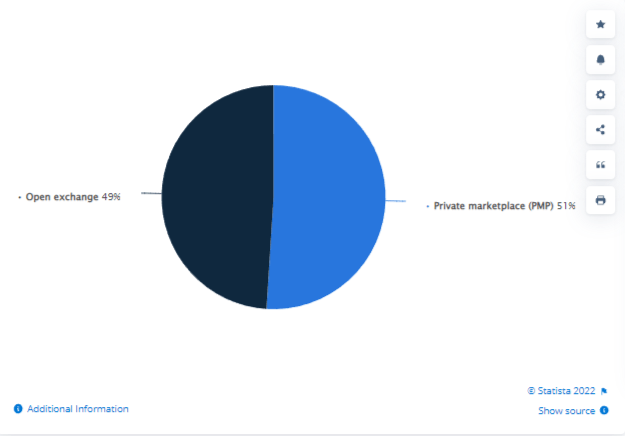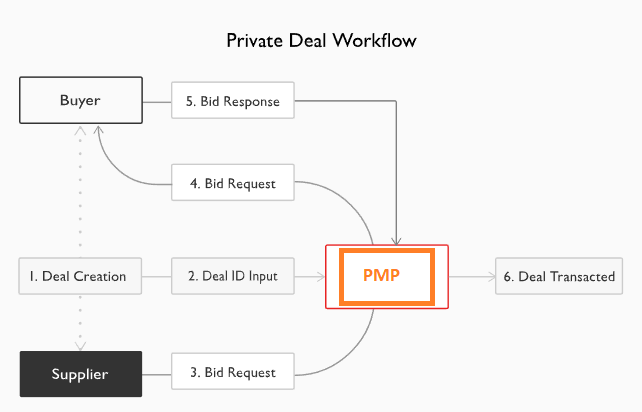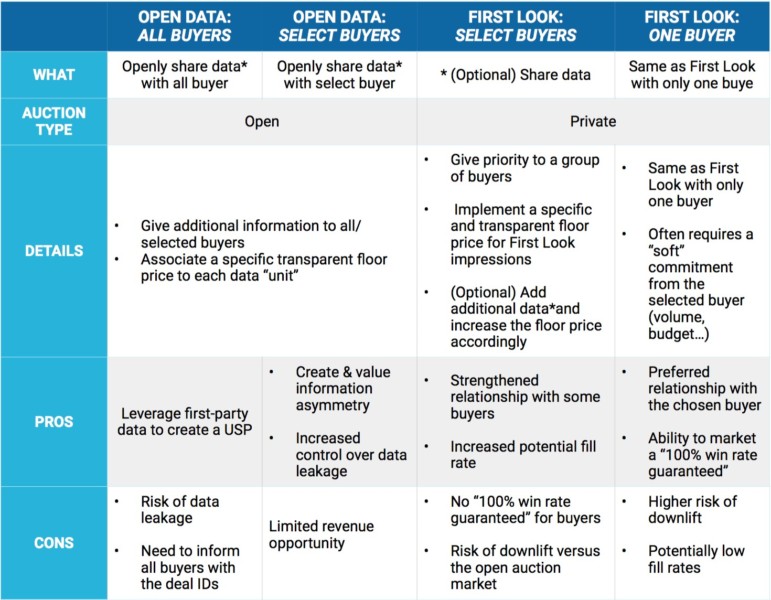Do you have questions about how to make the most out of Private Marketplace, PMP deals? We have the answers you’re looking for in this blog.
Ad spending on Private Marketplace (PMPs) has grown markedly over the last few years. So, why is this happening? Why publishers are shifting from open exchanges to PMPs? There are key reasons for this trend.
PMP deal is a programmatic media buying method that the publisher sets up only for select advertisers. Unlike open auctions, PMP is an invitation-only bidding process where publishers invite selected buyers to take place in real-time bidding.
The publishers set a minimum price for the bidding that is referred to as the ‘floor price’ and is negotiated before the auction starts.
Also Read: The Four Types of Programmatic Deals
Some of the Benefits of a Private Marketplace/PMP Deal are:
- PMP deals give publishers better inventory control.
- Direct access to first-party data for advertisers.
- Allow publishers to invite advertisers to bid selectively.
- Improves ROI and pricing for publishers and brand safety & response rates for advertisers
PMP deals provide benefits for both publishers and advertisers.
For Advertisers, the main benefits are:
- Access to premium inventory
- Brand safety and transparency
For Publishers, the main benefits of PMP deals are:
- Better quality ads from the advertiser
- Higher eCPMs rate
- A stronger relationship with advertisers
Stats and Facts of Private Marketplace (PMP Deal)
According to eMarketer, by the end of 2022, PMP spending will represent 17% of total programmatic digital display ad spending, compared to 13% being spent on the open exchange.

According to Digiday’s report, the private marketplace has been the primary choice of publishers for monetizing their programmatic direct business. The programmatic deals on a private marketplace guarantee benefits like content adjacencies and more impressions & engagements.
5 Tips to Make Your PMP Deals More Exclusive
Private marketplaces allow publishers to select or release premium inventory to a select group of advertisers who are willing to pay a higher CPM price tag. For a successful PMP deal between Publisher and Advertiser, here are a few key suggestions to consider:
1) Analysis of Marketplaces (Open vs Private)
A growing number of publishers are turning to PMPs to meet the stringent requirements of advertisers. But as we all know that CPM rates depend on the type of marketplace.
So, before you start negotiations with the advertisers, ensure that you have analyzed the value of inventory as per the open auction marketplace. It gives publishers the benefit of offering the ideal and right CPM rate in front of the advertisers and proceeding with the PMP deal.
On the other hand, in Private Marketplace deals, publishers can share their first-party data with the buyers. And advertisers can reserve the ad inventories and ensure that every ad impression matches their first-party data list. Private marketplace deals are more targeted and premium than open auction deals, which is reflected in the price.
It’s relevant for top advertisers who demand brand safety and better ad viewability. And for publishers, this means a higher price for ad impressions. So, this is a win-win condition for all.
2) Make your Ads More Relevant
It is recommended to have PMP partners on the client side because client-side header bidding offers better match rates as you can enable cookie-syncing via your ad-tech partner.
Additionally, utilize key-value targeting in Google Ad Manager to enhance the targeting capabilities. Using key-value targeting, you can pass the context of the page, ad placements, etc., and allow the advertiser to display ads on the particular section or page.
Ad viewability is the main factor that matters within the Private Marketplace and Open Marketplace. It can be overlooked in the open auction to some extent. But in PMP deals, the viewability score is something that cannot be neglected. So, if you have set long-term goals for your PMP deals, you should first optimize the viewability of your ad inventories.
3) Use a Variety of Ad Creatives
Rich media creatives and video creatives yield better results than display creatives. For a PMP deal, offering a variety of ad format types, including video, display, and native sizes, along with rich media, will boost ad revenue to a great extent.
In addition, include custom ad sizes and formats that have a high impact across different devices for PMP deals. And make sure that high-performing ad sizes are kept at the higher floor price.
4) Offer a Fair & Transparent Deal
Transparency in PMP deals matters a lot. Whether it is a header bidding set-up or a PMP set-up, advertisers are most likely to invest more time and budget where they find granular insights and better transparency. For this reason, DSPs acknowledge full domain URLs sent by the ad request in deals.
However, many DSPs are limited to targeting the base domain and have no capability to go more granular. In such cases, publishers can offer contextual relevance to buyers within their PMP deals and encourage the targeting of the ads at the content level as well as position level.
Also Read: Demand Side Platforms (DSPs): How Are They Evaluated?
5) Check For Roadblocking
Although header bidding has created a fair platform by levelling the buyers at the same level, it has also reduced the priority of buyers who are exclusively looking for direct access to valuable ad inventories. Due to this fact, PMPs and various other solutions are being introduced in the marketplace.
One such example is Roadblock. Roadblocking is the feature that enables a publisher to display ads from a single advertiser on the same webpage at the same time. That means a 100% share of voice (SOV) for an advertiser.
Once you have selected the best partners and understand the goals of advertisers, develop a strategy and keep optimizing the deals at regular intervals of time.
Role of Deal IDs in a Private Marketplace (PMP Deal)?
The Deal ID in a private marketplace is a line item of the unique string of characters that defines floor pricing and data depending on what platform you’re using.

- There can be multiple types of Deal IDs depending on how many publishers and advertisers are connected and where the deals are being accessed.
- A deal ID allows publishers to provide buyers with a curated selection of inventory in an invite-only auction at a specified CPM price.
- Publishers can use this deal Id to connect to buyers on supported Demand Partners (DSPs).
Setting up a Deal ID
To set up a deal ID, the following information is needed:
- Buyer name
- Buyer seat ID
- DSPs
- Start and end date/time
- CPM price
- Targeting and capping settings
- Audience Targeting
- Inventory on which the Deal ID will run
Deal IDs not only allow advertisers and publishers to successfully execute their media strategy but also maximise revenue opportunities.
Here are a few more reasons why Publishers should be doing private marketplace auctions with deal IDs:
- It offers reliability, control and flexibility over premium ad inventories to both publishers and advertisers.
- Provide better quality ad campaigns than the open market, as buyers with deal Id can only bid and win the impressions.
- It offers transparency in the process of buying inventories to both publishers and buyers, which means better revenues.
- On a deal Id, publishers can set multiple criteria like pricing and ad placements that don’t impact page load speed.
What’s Next?
Finally, Programmatic PMP deals help publishers to better optimize their ad revenue because it offers premium ad placement and viewability scores, and eCPMs in PMP deals are often higher.
If you are looking to learn more about how you can also benefit from PMP deals, let us know. We make sure that our partners are using the most innovative tools and efficient technologies to help you grow.
Looking for help setting up PMP deals and meeting your ad revenue goals? Get in touch with us to help you out.
FAQ
a) Higher CPMs
b) Programmatic Efficiency
c) Transparent Process
d) No Direct Sales Team
a) Premium Inventory
b) Programmatic Efficiency
c) Brand Safety
d) Transparency in Deals
With PMP advertising, your ad space inventory is privately offered to selected advertisers. Publishers can also set a premium rate for their exclusive inventory while ensuring that the ad creatives used are relevant to their audience.

Shubham is a digital marketer with rich experience working in the advertisement technology industry. He has vast experience in the programmatic industry, driving business strategy and scaling functions including but not limited to growth and marketing, Operations, process optimization, and Sales.





![CTV vs OTT Advertising: Which one is Right Pick for Publishers? + [6 Bonus Strategies] Ott vs Ctv](png/featured-image-270x180.png)


